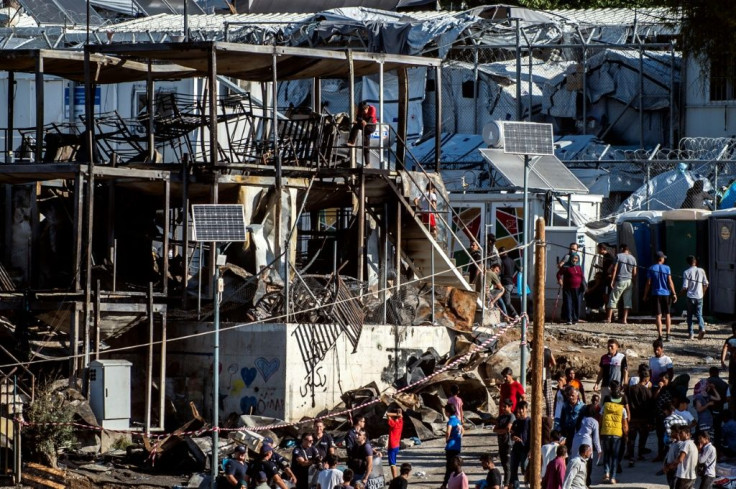Hundreds Of Migrants Protest Conditions On Greek Isle Of Lesbos

Around a thousand migrants staged a fresh protest Tuesday in Europe's largest migrant camp on the Greek island of Lesbos, two days after a deadly fire at the vastly overcrowded facility.
A procession made up mainly of women and children, with some elderly people, left Moria camp walking towards the port of Mytilene, with demonstrators shouting slogans.
But police road-block stopped them half-way to Mytilene.
The protesters carried placards in English reading "Moria is hell" and "Freedom", and carried a stretcher covered by a shroud probably to represent the woman killed in Sunday's fire at the camp.
The fire, which sparked riots the same evening, injured another 17 people, who are being treated in hospital.
"Moria is like a jungle, a cemetery," said one protester, Fazel Ahmad, from Afghanistan.
"I thought I was coming to a country that respects human rights, but what is happening in Moria has nothing to do with human rights," he told AFP.
The region's chief of police Eleftherios Douroudous tried to calm the angry crowd.
"You will be moved to other camps with better conditions in a month," he told them.
"Unaccompanied minors will also be moved to suitable conditions within October. I understand the difficulties," he added, appealing to them to be patient.
'De facto detention camps'
At the same time, a delegation from Oxfam France was visiting a makeshift camp that has sprung up outside Moria, where tents and improvised shelters have spilled over into the olive groves.
"It's worse than I imagined," Cecile Duflot, the head of Oxfam France, told AFP as she waited to enter the camp.
"We are in Greece, a European Union country. More than 40 percent of those living here are children. We need to ensure that the situation changes."
People needed to wake up to the burden that Greece and its islands were carrying, she said, adding: "We cannot be satisfied with what are de facto detention camps."
Moria was designed for 3,000 people but currently houses 13,000 after a surge of arrivals in recent weeks from Turkey.
Greece announced on Monday it wanted to send back 10,000 migrants to Turkey by the end of 2020 after an emergency cabinet meeting following the fire at the camp.
These returns are provided for in a 2016 agreement between Turkey and the European Union.
The conservative government of Prime Minister Kyriakos Mitsotakis has already announced more naval patrols in the Aegean, closed centres for migrants refused asylum, and plans to overhaul the asylum system.
Greece hosts some 70,000 mostly Syrian refugees and migrants who have fled since 2015, crossing over from neighbouring Turkey.
There are more than 26,000 people in the five migrant camps scattered across the Aegean islands, which have a capacity to welcome only 6,300 or so, according to the latest government figures.
© Copyright AFP 2024. All rights reserved.











